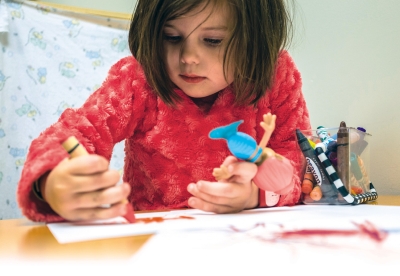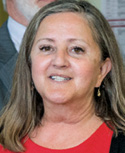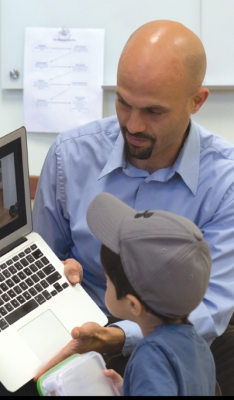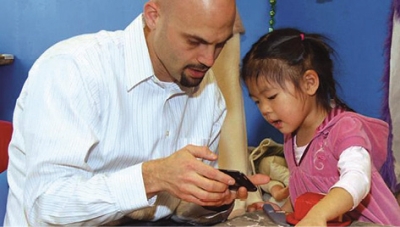Growing with their Peers: Giving Kids on the Autism Spectrum Access to Inclusive Learning
- Joshua Plavnick
- Associate Professor
- Director, Early Learning Institute
- Department of Counseling, Educational Psychology and Special Education
- College of Education
- Katherine Lalonde
- Assistant Professor
- Clinical Director, Early Learning Institute
- Department of Counseling, Educational Psychology and Special Education
- College of Education
- Laurie Linscott
- Director, Child Development Labs
- Department of Human Development and Family Studies
- College of Social Science

MSU's Early Learning Institute delivers inclusive, evidence-based therapy to young children on the autism spectrum.
 MSU's Early Learning Institute (ELI) offers a unique opportunity to children in mid-Michigan who have autism spectrum disorders (ASD). Utilizing a model developed by ELI director Joshua Plavnick and his colleagues in the Colleges of Education and Social Science, ELI provides an inclusive learning environment in community-based settings, where young children on the autism spectrum can learn and grow with their typically developing peers, with the goal of preparing them for kindergarten.
MSU's Early Learning Institute (ELI) offers a unique opportunity to children in mid-Michigan who have autism spectrum disorders (ASD). Utilizing a model developed by ELI director Joshua Plavnick and his colleagues in the Colleges of Education and Social Science, ELI provides an inclusive learning environment in community-based settings, where young children on the autism spectrum can learn and grow with their typically developing peers, with the goal of preparing them for kindergarten.
Through the services offered and research conducted at ELI, Plavnick hopes to reach a greater diversity of children, including those with more severe autism and those of lower socioeconomic status.
"We've kind of set ourselves apart in that we work extensively with families on Medicaid, so that we have a range of children in the program, and so that we meet the needs locally," said Plavnick. "And we do not restrict the kids in the program based on any kind of a prescreening language assessment. We try to take kids in the order they're referred, regardless of the severity of the disability."
A Model of Inclusive Learning
Early Learning Institute Locations
Michigan State University Child Development Laboratory
325 W. Grand River Avenue
East Lansing, MI 48823
Grand River Elementary Magnet School
CACS Head Start Program
1107 E. Grand River Avenue
Lansing, MI 48906
Holt Public Schools
Midway Early Learning Center
4552 Spahr Avenue
Holt, MI 48842
ELI uses the principles of applied behavior analysis (ABA), an evidence-based system of applying interventions with the goal of improving socially significant behaviors. For children who attend ELI, ABA therapy is given in a unique, inclusive setting four days a week.
At the beginning of a typical day at one of ELI's three centers, a child is greeted by a behavior technician who works with that child throughout the day, providing one-on-one, individualized therapy in each activity and setting: the intensive therapy classroom, small groups, the inclusive classroom, lunchtime, and recess. Every activity is structured to meet that child's individual social behavioral objectives.
"From a research perspective, what we're looking at is trying to deliver evidence-based practices across a range of contexts for each child," said Plavnick. "The idea is to break things down into component parts and isolate ways of teaching these parts within each environment that should bring about social or communication behavior or play with other children."
The Birth of ELI
 ELI's first of three locations is housed within MSU's Child Development Laboratory (CDL) on Grand River Avenue in East Lansing. CDL director Laurie Linscott knew of a child attending the CDL who had to go to three different locations each week to receive the ASD services he needed. She began to think about the possibility of offering inclusive services at the CDL.
ELI's first of three locations is housed within MSU's Child Development Laboratory (CDL) on Grand River Avenue in East Lansing. CDL director Laurie Linscott knew of a child attending the CDL who had to go to three different locations each week to receive the ASD services he needed. She began to think about the possibility of offering inclusive services at the CDL.
"It was really serendipity that Josh and I ran into each other and started talking about what that could look like," said Linscott. "What could an autism therapy program look like in a setting where they could get therapy and then really be able to transfer and utilize those skills in an inclusive setting?"

ELI director Joshua Plavnick demonstrates research-informed technology used with children in ELI's program.
 Dr. Kate LaLonde, ELI clinical director, is a board certified behavior analyst (BCBA) responsible for training the technicians who are implementing the therapy with the children each day. She has also been integral to ELI's development. She said one of their goals was to make the Institute as much like a regular preschool as possible.
Dr. Kate LaLonde, ELI clinical director, is a board certified behavior analyst (BCBA) responsible for training the technicians who are implementing the therapy with the children each day. She has also been integral to ELI's development. She said one of their goals was to make the Institute as much like a regular preschool as possible.
"I think that's one of the unique characteristics of our program, and something we have a lot of fun being innovative about," said LaLonde. "How can we provide the best therapy possible and make it feel like a typical preschool? So that's been really fun and challenging, but we're having good success with it so far."
She believes having fun is an essential component of the ELI experience. "Many children with ASD don't prefer to be around people," said LaLonde. "So a big thing that we push at the center is, people have to be fun. The children have to want to be around adults and other kids, and so we have a lot of fun there!"
As plans for ELI took shape, they began to receive support from private donors like Mike and Kathy Bosco, who provided money for the renovation work, as well as from the University. "The University was very supportive of the program," said Linscott. "And in a very short time—I think it was less than a year from when we started talking about it until it really launched—we were able to start the Early Learning Institute."
Training Advocates of the ELI Model
Students are key to ELI's programming, and the Institute's innovative approach is drawing them in. Ana Dueñas is a second year doctoral student from San Diego who works as both a clinician and a researcher at ELI. She says she was drawn to MSU because of ELI.
"This is why I came here, because there are not a lot of programs like this intensive, early intervention program embedded in the community, anywhere in the country," she said. "The ELI program is very rich in terms of its components and is very comprehensive, so I knew that there would be a part in it that I could play. It's been also a big part of my development as a researcher and as a clinician, and there are continuous opportunities to try new things, not just research-wise, but clinically, and in constant collaboration, because we are in the community and have been expanding fairly rapidly."
Master of Arts in Applied Behavior Analysis
MSU's Master of Arts in Applied Behavior Analysis (MA-ABA) program, started in fall 2016, prepares students to be highly competent behavior analysts with in-depth knowledge and applied competence in the development and delivery of behavior analysis programming to improve the quality of life of children with autism, intellectual, and neurodevelopmental disabilities. Students who complete the MA-ABA program at MSU will be eligible to take the examination to become a Board Certified Behavior Analyst.
This program is relevant for persons interested in pursuing careers in behavior analysis that require the Board Certified Behavior Analyst (BCBA) credential. This is a hybrid program, offering the convenience of online coursework combined with on-campus instruction and a small cohort. Practicum fieldwork is supervised directly by MSU faculty.
For more information
When asked what she will take from her experience at ELI: "Everything! This program has definitely shaped me as a researcher," said Dueñas. "The Early Learning Institute being embedded in the community has solidified my belief that research, eventually, should always be applied, and the social validation of what we do is very important, especially in education. So I hope to take everything that I've learned and will continue to learn to wherever I end up."
Growing to Reach More Kids
Since 2015, ELI has experienced rapid growth, expanding into locations in Lansing and Holt. Plavnick had been doing collaborative research with the Holt Public Schools for a number of years, and this fall, the Midway Early Learning Center in Holt became the home of ELI's third site. Wayne Abbott, the special education director for Holt Public Schools, facilitated the connection and is part of the team coordinating the logistics of opening the ELI classroom at Midway. He believes ELI is a good fit with the Holt Public Schools' special education programming.

Children in ELI's program receive individualized therapy in a variety of contexts each day, including in the one-on-one intensive therapy classroom, as well as in the inclusive classroom.
"In Holt, our philosophy for students with ASD emphasizes independent functioning and social skills," said Abbott. "We also adhere to evidence-based practices for students with ASD. The ELI program will complement our district guiding principles for students with ASD by delivering high quality, evidence-based programming at the preschool level. They will also provide an added benefit of distributing quality care in our community."
Looking to the future, Plavnick would like to see even more kids benefit from the ELI approach, and believes the ELI model is well-suited for broad implementation in a number of communities. "They don't need to start something new or unique, because everybody has an early childhood center—every county, agency, and city," said Plavnick. "So from that perspective, the feasibility of implementation with eight children in one site, we feel is a unique component that we hope will lead to broader implementation."
For more information about the Early Learning Institute, visit http://earlylearning.msu.edu/. To learn more about research being done at ELI, please view the following YouTube videos:
Helping More Kids With Autism
Joshua Plavnick
Taking New Perspectives
Brooke Ingersoll
- Written by Amy Byle, University Outreach and Engagement